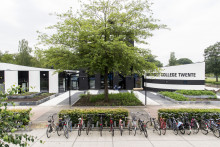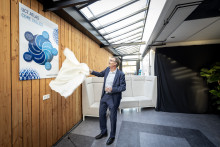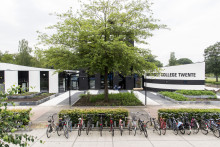ATLAS is always a topic for elaborate discussion, both inside and outside its walls. A quick search on U-Today learns that concerns about student influx and finances have been of all times. With an ear to the ground, one finds out that the unconventional educational concept is also widely debated. An attempt to summarise this leads to the following: “The ‘liberal’ programme with students who are allowed to do just about whatever they want, compiling an incoherent patchwork of educational activities on their transcript that may or may not land them a job or entry into a Master’s degree at the end of the programme”. Virtually everyone has an opinion on what is going on in the programme, some more favourable than others.
Against this background, a rather critical evaluation of the programme was published last week. Seeing that U-Today’s news article about the evaluation and the interview with rector Veldkamp in response to the article were well read on U-Today, we can conclude that our college has made it to the top of the discussion list, again. The report points out unrest in the programme, trouble in the communication with other programmes, and subsequent stress among educational and supportive staff. The first change to the organisation has been decided upon, Heleen Miedema will join us as interim dean to address the identified challenges. To the ones not directly involved, the College might seem aflame, yet this is not the complete picture. As many students felt the need to respond, a group of 9 students decided to write up this article to show the other side to the story.
Let us start by saying, the evaluation addresses valid points, and we are not writing to make an attempt to debunk this. We have read the report with a sense of recognition. However, the points raised in the evaluation solely apply to the organisation of the College, not to the quality of education, achieved learning outcomes, teachers, or community. Though organisation is important, it only is a part of our college. As such, there is no doubt for us that the programme will overcome these challenges, and here are the most important reasons why.
First of all, the problems in the organisation of the College do not affect students as much as you may think. We, as students at the College, are in charge of our own learning in the end: we know where we want to go and decide what courses we take to get there. Whenever we get stuck, our academic mentors are willing to sit down and listen to whatever is going on in our minds. Whenever we need advice on courses, experienced students are there to lend a hand. This support helps us to choose, while we remain in control. This makes that we can reach our goals and remain confident about our academic progress, regardless of the challenges we ourselves and the programme face.
Secondly, the personal approach and tightness of the community act as a cushion to maintain education of high quality. The commitment of the staff, also mentioned in the evaluation, goes beyond the courses they provide. Most of the time, they cannot resist to think along with your challenge, to the point where you ask a teacher for help on an external course, and they come into the room with a stack of learning materials to help you out. This ambition to go beyond, in- and outside of the programme, is fostered by the community. Overall, it keeps learning at a high level.
Lastly, in this learning community, we feel safe to voice our own struggles with the programme. The learning community in ATLAS brings staff and students closely together and facilitates many interesting discussions about ongoing events as well as personal and academical problems. ATLAS-related topics can be sure to receive widespread and engaged discussion, just like the recent evaluation and U-Today article, and extends to virtually any educational subject or societal debate. This tightknit and open culture results in not only teachers perceiving and empathising with the student’s struggles, but also students perceiving and empathising with the stress on teachers. In this environment we feel safe to voice our own struggles in the programme, which enables us to truly collaborate on educational and organisational challenges. In the end, this makes us proud to be part of ATLAS.
As said, we are aware of the challenges ATLAS faces, now maybe more than ever. Nevertheless, the report and the article do not address what is ultimately at the heart of the University College. The learning community of students, educational-, and supportive staff is strong and makes for a quality programme. This tremendous effort should not go unacknowledged. The commitment of everyone involved make us confident that the organisational challenges can be overcome. This inspiring learning environment can be supported better and become available to more students. Imagine all this commitment being free of organisational burdens. We are looking forward to this moment. Let this be a warm welcome to Heleen Miedema as our new dean.
Leon van der Neut, alumnus, Class of 2020
Wout Ploeg, alumnus, Class of 2020
Dhirendra Adiprakoso, alumnus, Class of 2021
Olaf Jansen, Class of 2022
Marloes Vaessen, Class of 2022
Jorijn Oosterhuis, Class of 2023
Merijn Janssen, Class of 2023
Luuk Winters, Class of 2023
Casper Kunowski, Class of 2024







